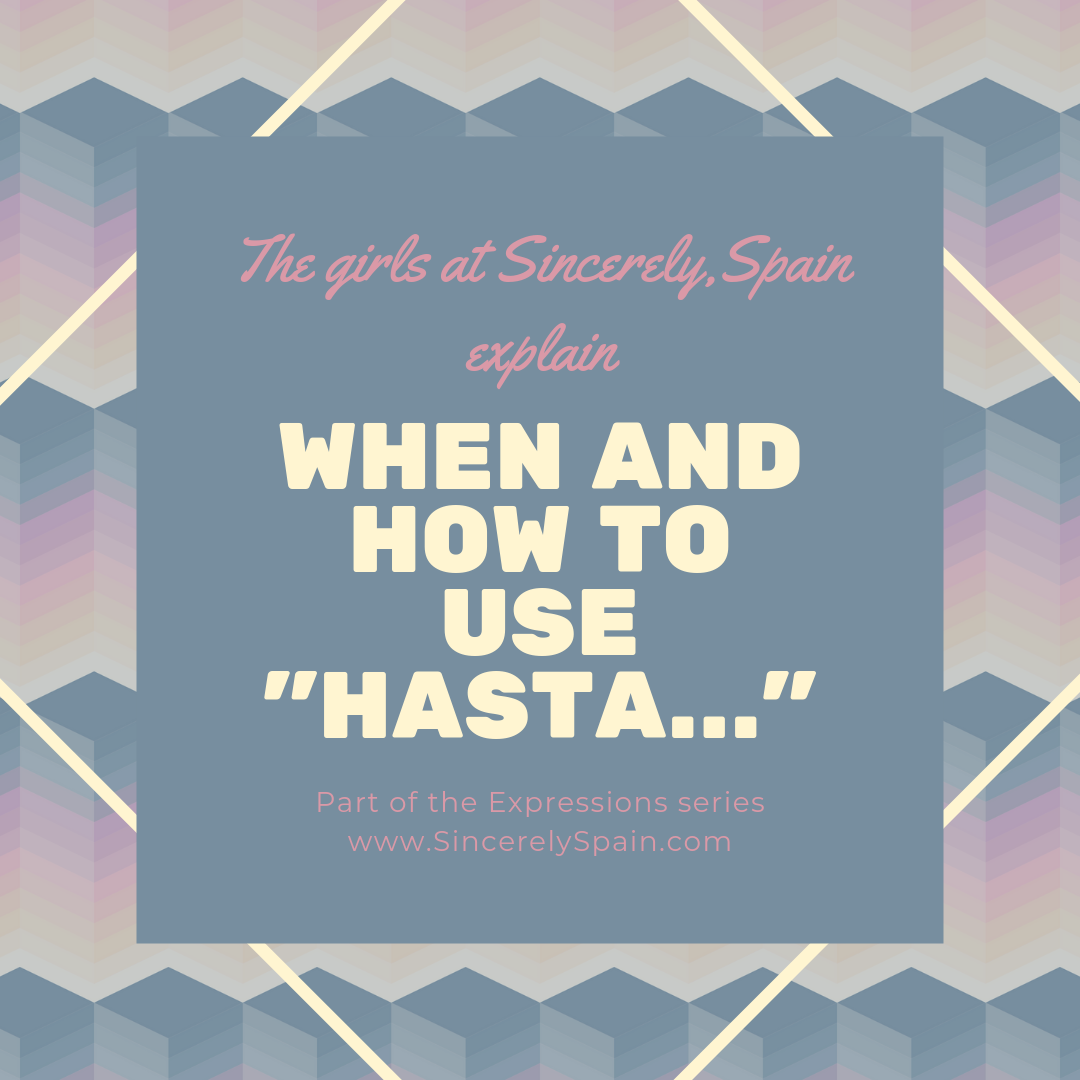
Expressions: When and How to Use “Hasta…”
Please Note: This post contains affiliate links to products, Which means that we may receive a commission for purchases. For more information, see our disclosures here. Thanks for your support!
Dear Glen,
Thanks to Arnold Schwarzenegger’s Terminator 2 catchphrase “Hasta la vista, baby!” people around the world have become at least somewhat familiar with expressions that start with ‘hasta’ and (at least I hope) know that this is Spanish for “see you…” However, once you start learning, listening to, and using Spanish, you’ll find that there are quite a few different ways you can end that expression! Each one comes with a slightly different direct translation and actual usage so let’s dive into these options to help you decide which one to select as your own personal catchphrase…
Hasta luego
Rough English translation: Literally speaking, hasta luego translates to “see you later”* and is the most common way to say goodbye to someone in Spain. It also carries the least amount of connotation so you are the least likely to make a mistake with this one. Feel free to end conversations with family, close friends, acquaintances, and even strangers with this one without any sort of sideways glances.
Pro-Tip: Here in Andalusia where people like to speak quickly and ‘eat off’ some of the letters of words, don’t be surprised if this expression sounds more like ‘ta wuego.’
Example in context: Let’s say you’re enjoying some tapas at a bar in the city center. As you get up to leave, your friend explains she’s going in the opposite direction so you proceed to say your goodbyes. You’ll probably give her dos besos, and close the conversation with an ‘¡hasta luego!’ As you walk off in the opposite direction you pass your waiter who thanks you for coming, to which you’ll likely response with “[Gracias] a ti. ¡Hasta luego!” (Thanks to you. See you later!”), too.
Hasta pronto
 Rough English translation: Literally speaking, hasta pronto translates to “see you soon.” However, be aware that this is not the correct way to say “see you soon” to friends who you will see shortly. Instead, this “see you soon” is used in cases in which you will not see someone for a long period of time or when you have no idea when the next time you will see them may be. In fact, I’ve been corrected many times by friends in Andalucía as this expression may come across as a cold to people in this region who are very warm friendly and optimistic about further encounters. Instead, this “see you soon” is more common in business relationships and is generally perfectly correct to use, but keep in mind that you cannot combine it with any reference to future plans, i.e. Nos vemos manana, ¡hasta pronto! or “See you tomorrow, see you ‘soon’” would not be appropriate.
Rough English translation: Literally speaking, hasta pronto translates to “see you soon.” However, be aware that this is not the correct way to say “see you soon” to friends who you will see shortly. Instead, this “see you soon” is used in cases in which you will not see someone for a long period of time or when you have no idea when the next time you will see them may be. In fact, I’ve been corrected many times by friends in Andalucía as this expression may come across as a cold to people in this region who are very warm friendly and optimistic about further encounters. Instead, this “see you soon” is more common in business relationships and is generally perfectly correct to use, but keep in mind that you cannot combine it with any reference to future plans, i.e. Nos vemos manana, ¡hasta pronto! or “See you tomorrow, see you ‘soon’” would not be appropriate.
Example in context: While I’ve had friends correct me on the connotation of this term, there are many perfectly normal cases in which you can use this expression. However, it should NOT be after you’ve made plans to see someone (because you will clearly see them soon in that case) or with close friends or acquaintances you see regularly. If it’s clear to both people that there will, in fact, be a long period of time before your next encounter this is the way to go! Let’s say you’re meeting up at that same bar with your Spanish intercambio to thank them and say goodbye before you return to your home country. In this case, it would be just as valid to close with hasta pronto as it would to close with hasta luego.
Hasta ahora
Rough English translation: Literally speaking, hasta ahora translates to “see you now” but in reality this is the Spanish equivalent to “see you soon.” In most cases, if you’ve found yourself wanting to use hasta pronto because you directly translated from English, the more accurate, friendly option you’re looking for is actually hasta ahora. Spaniards will use this frequently to indicate that the time in which you next encounter each other truly will be soon.
Example in context: This expression is especially useful when you already have plans with someone. I personally use it when said plans are within a few hours but it could arguably be used anytime your plans are within the same day or perhaps longer depending on how you and the people you’re speaking with define ‘ahora.’ Thus, if my friend and I were chatting over Whatsapp to confirm our plans to meet at that bar tonight I might say “¡Vale, perfecto! Hasta ahora” (Okay, perfect! See you soon).
 Hasta entonces
Hasta entonces
Rough English translation: Literally speaking, hasta entonces translates to “see you then” and this is the practical translation as well. Again, this expression is only used if you have plans with someone or if a specific event or occasion has been mentioned in the conversation. Like in English, ‘then’ or ‘entonces’ has to refer to something, thus this expression would be inappropriate if such an occasion did not exist.
Example in context: I like to use this expression when closing a conversation in which I’ve made or confirmed plans with someone for a later date, although it can also be used for the same day. Thus, if I were talking to my same friend today about our intentions to meet up on Saturday I might close with “¡Vale! Si algo cambie, te aviso pero si no, ¡hasta entonces!” (Okay! If something changes, I’ll let you know but if not, see you then!”).
Hasta la vista
Rough English translation: Literally speaking, hasta la vista translates to something like “see you next time” or “until the next time we meet.” I’ve actually never seen any of the Terminators movies but from my understanding this essentially means that it’s a poor choice for the Terminator’s closing line as the idea of terminating someone is that you won’t see them again. Nonetheless, since I opened the article with a reference to this term I wanted to at least provide a translation for anyone hanging on for that one.
 Example in context: To be completely honest with you, I’ve never heard a Spaniard use this expression unless is was to quote the movie. At least in this part of the world, I would select one of the above hasta expressions unless you want to receive a chuckle and hear Spanish impressions of Schwarzenegger. A better alternative for “until next time” would also be hasta la próxima.
Example in context: To be completely honest with you, I’ve never heard a Spaniard use this expression unless is was to quote the movie. At least in this part of the world, I would select one of the above hasta expressions unless you want to receive a chuckle and hear Spanish impressions of Schwarzenegger. A better alternative for “until next time” would also be hasta la próxima.
Hope these quick explanations can help you in your Spanish conversations! Let us know if you have any other specific doubts we can help clear up in future Spanish expressions articles.
Sincerely,
Spain
*Okay, well if we’re being literal, hasta means ‘until’ however since we don’t say things like ‘until later’ or ‘until soon’ as a common closing in English I’ll be translating to ‘see you __.’





3 Comments
Dbrennan262@gmail.com
For the record, hasta does not literally translate to “see you”, like the author said it does. Hasta literally translates to “until”. Otherwise good article.
Dbrennan262@gmail.com
Ok I just saw the * at the end where the author explains this.
Nicktrevor1@gmail.com
If meeting later in a spaghetti house , you say “ hasta pasta “.